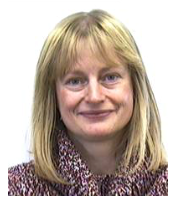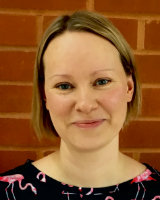Our staff
Our researchers working on the project are experts in different areas of rheumatoid arthritis and have made major contributions to current understanding of the disease. They include:
Dr Amy Anderson
I am a cellular immunologist with a strong grounding in human translational work. My main research interests are the development of new diagnostic and therapeutic tools for the treatment of rheumatoid arthritis (RA). In order to develop these it is vital we fully understand the immune responses in RA that are involved in attacking the body’s own tissue and inducing the inflammatory process.
With this in mind I am particularly interested in a novel subset of B-cells which play a potential role in RA disease pathogenesis via the secretion of autoantibodies and the production of pro-inflammatory cytokines. I collaborate with Dr Dagmar Scheel-Toellner and we currently co-supervise a PhD project investigating the role of these cells in RA. The ultimate aim of this project is to identify novel therapeutic targets that will improve treatment of RA.
Prof Jim Brewer
 I am Professor of Basic Immunology in the Institute of Infection, Immunity & Inflammation at the University of Glasgow. My research applies advanced imaging techniques to study the immune system in real time, in vivo. In collaboration with Prof Paul Garside, we have applied these approaches to understand how, when and where immune system cells are switched on and off in arthritis models and identify molecules involved in this decision making process.
I am Professor of Basic Immunology in the Institute of Infection, Immunity & Inflammation at the University of Glasgow. My research applies advanced imaging techniques to study the immune system in real time, in vivo. In collaboration with Prof Paul Garside, we have applied these approaches to understand how, when and where immune system cells are switched on and off in arthritis models and identify molecules involved in this decision making process.
These studies are enabled by a state of the art imaging technologies (e.g. multiphoton microscopy, microendoscopy, whole body imaging, high content imaging) that we have established at the University of Glasgow. We collaborate with physicists, mathematicians and chemists to continue development of new non-invasive, translational cell-imaging approaches and combine them with in vivo biological approaches in immunology such as cell specific reporters, cell fate tracking, transcriptomics and cell sorting.
Prof Chris Buckley
I am the Kennedy Professor of Translational Rheumatology and Director of the Birmingham NIHR Clinical Research Facility. I also lead the Rheumatology Research Group at the University of Birmingham. In 2017, I took up a new joint academic post between the Universities of Birmingham and Oxford as Director of Clinical Research at the Kennedy Institute of Rheumatology and Director of Infrastructure for Birmingham Health partners.
The main focus of my research is concerned with investigating the role that tissue resident stromal cells (fibroblasts) play in determining both the switch to persistence as well as the site at which inflammation occurs.
Dr Ruaidhri Carmody
 The Carmody laboratory is based in the Institute of Infection, Immunity and Inflammation at the University of Glasgow and researches the transcriptional regulation of inflammation with a particular emphasis on the transcription factor family NF-κB. The primary goal of the laboratory is to understand the molecular mechanisms by which gene transcription is regulated during inflammation and to develop ways to exploit transcriptional regulators for therapeutic benefit.
The Carmody laboratory is based in the Institute of Infection, Immunity and Inflammation at the University of Glasgow and researches the transcriptional regulation of inflammation with a particular emphasis on the transcription factor family NF-κB. The primary goal of the laboratory is to understand the molecular mechanisms by which gene transcription is regulated during inflammation and to develop ways to exploit transcriptional regulators for therapeutic benefit.
Prof Andy Clark
 I am Professor of Inflammation Biology at the Institute of Inflammation and Ageing, University of Birmingham. I have been mainly funded by Arthritis Research UK and the Medical Research Council. My research focuses on macrophages, white blood cells that produce tumour necrosis factor (TNF) and many other factors contributing to the development of rheumatoid arthritis.
I am Professor of Inflammation Biology at the Institute of Inflammation and Ageing, University of Birmingham. I have been mainly funded by Arthritis Research UK and the Medical Research Council. My research focuses on macrophages, white blood cells that produce tumour necrosis factor (TNF) and many other factors contributing to the development of rheumatoid arthritis.
I am interested in the molecular mechanisms that cause macrophages to switch off the production of inflammation-promoting factors, and instead promote tissue repair and regeneration. It is possible that faulty “off switches” contribute to the development of chronic inflammatory disease. Whether or not this is true, reinforcement of these switch mechanisms could be an effective way to treat inflammation and encourage healing. I am also increasingly interested in how macrophages communicate with other cells in inflamed joints, and how this communication sustains inflammation and leads to chronic disease. My main RACE collaborator is Mariola Kurowska-Stolarska, with whom I share supervision of a PhD student. Together we are investigating how macrophage functions are altered by the anti-inflammatory hormones known as glucocorticoids.
Prof Andrew Filer
 I am a Reader in Translational Rheumatology and honorary consultant in rheumatology in Birmingham.
I am a Reader in Translational Rheumatology and honorary consultant in rheumatology in Birmingham.
I run the Birmingham Early Arthritis BEACON cohort with Prof Karim Raza. The patients in this cohort help us to develop better tests for use in early arthritis; I have particular expertise in musculoskeletal ultrasound imaging which we are developing as just such a new test. However, we also use ultrasound to obtain tiny samples from the joint that help us understand the processes going on in the earliest phases of disease.
The focus of my scientific work is to use these samples to examine the role of a specific group of cells (stromal cells or fibroblasts) that appear to play an important part in deciding whether arthritis in joints will persist to become chronic, or get better without long term medication. This links to a key focus of RACE, which is to understand better the role of stromal cells in chronic disease. I am leading Birmingham’s role in two major clinical trials (TRAFIC and Bio-FLARE) where the RACE team members are conducting a clinical trial of a new treatment that targets fibroblasts, and learning about the role they play during flares of disease.
Dr Ben Fisher
I am a Senior Clinical Lecturer at the University of Birmingham with a research focus on clinical aspects of both rheumatoid arthritis (RA) and Sjögren’s syndrome.
I have a long-standing interest in antibodies to citrullinated proteins (ACPA), which have a strong association with RA and may be detected years before the onset of RA symptoms. Understanding why these occur, and why someone with these antibodies goes on to develop RA, may give important clues to treating and even preventing the earliest phases of RA. I have been involved in studying ACPA in relation to genetic and environmental risk factors for RA, and in the pre-disease state. I am actively involved in observational studies and clinical trials in RA through participation in national collaborations.
Prof Carl Goodyear
 I am Professor of Translational Immunology and Director of the GLAZgo Discovery within the Centre for Immunobiology in the Institute of Infection, Inflammation and Immunity.
I am Professor of Translational Immunology and Director of the GLAZgo Discovery within the Centre for Immunobiology in the Institute of Infection, Inflammation and Immunity.
My research is focused on understanding immunopathogenesis of disease (i.e., Rheumatoid Arthritis & Osteoarthritis) and translating this knowledge into viable therapeutic agents for patients. I lead a Translational Immunology programme that provides the critical interface between clinical and basic science, with a specific focus on precision medicine. In parallel, I also the Director of the GLAZgo Discovery Centre, an ambitious collaboration between the University of Glasgow and AstraZeneca to drive innovative academic/industry research aimed at identifying new pathways by which inflammation can promote diseases and ultimately create better medicines for patients.
Dr Rowan Hardy
 I specialise in steroid metabolism, with extensive experience in inflammatory animal models. Having recently received a prestigious Career Development Fellowship I am now establishing a research group focussing on the roles of glucocorticoid signalling in inflammatory disease. Patients with RA develop complications such as muscle wasting and bone loss, which contribute to an increased risk of fractures, disability and reduced life expectancy.
I specialise in steroid metabolism, with extensive experience in inflammatory animal models. Having recently received a prestigious Career Development Fellowship I am now establishing a research group focussing on the roles of glucocorticoid signalling in inflammatory disease. Patients with RA develop complications such as muscle wasting and bone loss, which contribute to an increased risk of fractures, disability and reduced life expectancy.
My primary focus is exploring the roles of pre-receptor glucocorticoid metabolism in mediating these detrimental features of chronic inflammatory disease and examining a role for therapeutic agents that modify glucocorticoid signalling in their management. The inter-disciplinary collaboration linking the Institute of Metabolism & Systems Research and the Institute of Inflammation & Ageing that I have established ensures a fully translational approach to this research, with access to state of the art cell culture, molecular biology and animal husbandry facilities.
Prof Margaret Harnett
I am Professor of Immune Signalling in the Centre of Immunobiology at the University of Glasgow.
My lab focuses on the signalling mechanisms underpinning development of the immune response in health and disease in order to identify novel immunomodulatory drug targets to combat infection, inflammatory disease and cancer. The Hygiene Hypothesis predicts that the recent dramatic increase in autoimmunity partly reflects the rapid eradication of parasitic worms in the industrialised world, leaving us with unbalanced hyper-reactive immune systems. Striking inverse relationships between the incidence of musculoskeletal diseases such as rheumatoid arthritis (RA) and systemic lupus erythematosus (SLE) and helminth infection are beginning to emerge in the developing world.
In collaboration with Prof Billy Harnett at the University of Strathclyde, a particular focus has been to exploit the immunomodulatory properties of parasitic worm product ES-62 to identify key molecular and cellular nodes regulating pathogenesis in RA and SLE. This helps us identify novel targets for therapeutic intervention in these inflammatory diseases and has led to the generation of ES-62-mimicking compounds that can potentially be developed as novel anti-inflammatory drugs. Our Facebook site and website have more information about this.
Prof Catharien Hilkens
 I am a Reader in Immunotherapy at Newcastle University.
I am a Reader in Immunotherapy at Newcastle University.
My main research interests are to develop a tolerogenic dendritic cell-based immunotherapy for rheumatoid arthritis (RA), and to improve our understanding of how the immune system is involved in causing and maintaining joint inflammation in RA and other arthritic diseases.
Within RACE, I have close collaborations with:
- Prof. Simon Milling (Glasgow University) on the role of synovial macrophages in the pathogenesis of osteoarthritis
- Dr. Vicky Morrison (Glasgow University) on determining integrin-mediated regulation of dendritic cell function in rheumatoid arthritis
- Profs Jim Brewer and Paul Garside (Glasgow University) on understanding when, where and how tolerogenic dendritic cells modulate T cells
Prof John Issacs
I am Professor of Clinical Rheumatology at Newcastle University and Associate Medical Director (Research) in Newcastle Hospitals, where I am also a consultant rheumatologist. My expertise is in the development of novel immunotherapies to treat rheumatoid arthritis (RA). I am also interested in the abnormal immune response that underpins RA and my special interest is in tolerance inducing therapies. These have the capacity to ‘switch off’ the abnormal immune response, and provide long-term benefit from a brief period of treatment.
My research ranges from target identification through to early and late-stage clinical trials. My role within the RACE programme is to develop experimental medicine research to investigate novel concepts and treatments in the clinic, to oversee and provide scientific guidance to laboratory research programmes in Newcastle, and to mentor the next generation of rheumatology researchers.
Dr Vicky Morrison
 I am an Arthritis Research UK Career Development Fellow within the Institute of Infection, Immunity and Inflammation at the University of Glasgow.
I am an Arthritis Research UK Career Development Fellow within the Institute of Infection, Immunity and Inflammation at the University of Glasgow.
The focus of my research is to understand how dendritic cells, the key immune cell type responsible for inducing immune activation or tolerance, are controlled by adhesion molecules expressed on their cell surface called integrins. Using models of inflammation, tolerance and autoimmunity (rheumatoid arthritis), I am investigating how integrins suppress dendritic cell function, and how this influences interactions with T cells and the subsequent immune response.
Within RACE, I collaborate with Dr Catharien Hilkens at Newcastle University and together we co-supervise a PhD project which aims to advance into human cell studies. Specifically, we are determining the role of integrins in regulating human dendritic cells under normal and inflammatory arthritis settings, and investigating the therapeutic potential of this novel regulatory pathway.
Prof Mariola Kurowska-Stolarska
 I am a lecturer in Immunology at the Institute of Infection, Immunity and Inflammation, University of Glasgow.
I am a lecturer in Immunology at the Institute of Infection, Immunity and Inflammation, University of Glasgow.
The focus of my research within the RACE centre of excellence is to understand the mechanisms of synovial joint homeostasis. Synovial tissue macrophages are the main producers of pathogenic TNF that drives inflammation in Rheumatoid Arthritis (RA). We recently found that human synovial tissue macrophages are not all pathogenic in RA. They are heterogeneous and can be subdivided into different phenotypic and functional clusters (e.g. pathogenic producers of TNF, anti-inflammatory, homeostatic or regulatory, etc). The frequency and gene expression of these clusters differ between healthy people, patients with joint inflammation and in patients with resolved inflammation (remission).
The aim of our research is to uncover the full heterogeneity of synovial tissue macrophages in health and disease, based on single-cell transcriptomics, and to uncover the function of different clusters. We will identify the factors that drive activation of synovial tissue macrophage clusters with a homeostatic function that could provide novel targets to facilitate therapeutic restoration of synovial homeostasis in patients with arthritis. This research is conducted with RACE external collaborators, Dr Stefano Alivernini and Dr Elisa Gremese from Institute of Rheumatology, Fondazione Policlinico Universitario A. Gemelli – Catholic University of the Sacred Heart, Rome, Italy.
In addition, my research collaborators in RACE include (a) Thomas Otto and Andrew Filer with whom I share two RACE PhD students on projects addressing heterogeneity of synovial tissue macrophages and (b) Andy Clark with whom I share one RACE PhD student on a project investigating how macrophage functions are altered by glucocorticoids.
Dr Helen McGettrick
 I am an Arthritis Research UK Career Development Fellow at the University of Birmingham.
I am an Arthritis Research UK Career Development Fellow at the University of Birmingham.
Inflammation is the body's protective response to injury that aims to clear infectious organisms and repair tissue damage. A key element of this response is the controlled recruitment of immune cells (leukocytes) from the blood into the affected tissue. Tissue resident cells (fibroblasts) act to control inflammation, controlling the movement of leukocytes from the blood and into inflamed tissues. One way they can achieve this is by talking to neighbouring endothelial cells lining the blood vessel wall.
Our major goal is to understand how fibroblasts and endothelial cells 'talk' to each other to regulate the leukocyte recruitment during inflammation, and how this goes wrong in during the development of RA. Key concepts are can we change the instructions given by the fibroblasts such that they either block leukocyte entry into tissue or tell leukocytes to leave the tissue?
Prof Iain McInnes
Iain McInnes is Head of College of Medical Veterinary and Life Sciences, and Vice Principal, University of Glasgow, and serves also as the Muirhead Professor of Medicine and Versus Arthritis Professor of Rheumatology in the University. He is Director of the Versus Arthritis Centre of Excellence for Inflammatory Arthritis, lead from the University of Glasgow that includes Universities of Oxford, Newcastle and Birmingham. He serves as a member of the Greater Glasgow and Clyde Health Board. He is a Trustee on the Board of Versus Arthritis. He is past chairman of the Foreum (Foundation for European Rheumatology Research) Scientific Committee, lead the European Roadmap programme that is defining the research agenda for European rheumatology for the next decade and is Past-President of the European Alliance of Rheumatology Asssociations (EULAR). Under these auspices he led the creation of the first pan-European Rheumatology Research Centre launched in 2021. His work is mainly focused upon the understanding of the pathogenesis of immune mediated inflammatory diseases and encompasses basic discovery immunology through phase 1 and proof of concept experimental medicine clinical trials to leadership of pivotal phase 3 trials in the area of immune biology. His laboratory group performed original discovery work supporting the therapeutic targeting of a several inflammatory cytokines. More recently he has focused on the biology of myeloid cells in the pathogenesis of a number of immune diseases. He has served on a number of scientific advisory groups adjacent to the pharmaceutical industry, mainly in the area of development of novel immune modifying agents. He has published >550 peer-reviewed original and review articles with an h-index of >130 equating to around 100,000 citations. He is a Fellow of the Royal Society of Edinburgh and Fellow of the Academy of Medical Sciences. He was made Commander of the Order of the British Empire (CBE) in 2019 by HM Queen Elizabeth II.
Prof Simon Milling
 I am Professor of Immunology at the Centre for Immunobiology in Glasgow.
I am Professor of Immunology at the Centre for Immunobiology in Glasgow.
My lab focuses on the biology of antigen presenting cells in the blood and in the intestine, and on how these cells respond to infections or to inflammation. I am especially interested in the differences between the functions of the different types of antigen presenting cells, how these cells control the immune response, and their contributions to inflammatory diseases.
This work has so far contributed to two projects in the RACE programme. With Catharien Hilkens, I have been investigating how macrophages in synovial tissues may contribute to the pathogenesis of osteoarthritis. With David Withers, I have been investigating the functions of innate lymphoid cells, and how they might also contribute to inflammatory disease. It is hoped that this information will be useful for manipulating the immune response, to generate improved strategies for inhibiting inflammatory pathology.
Dr Amy Naylor
 I am an Arthritis Research UK Career Development Fellow at the University of Birmingham. My research aims to find ways to boost osteoblast activity in order to increase bone formation and repair. Bone turnover and remodelling is critical for the maintenance of bone health. Many diseases associated with inflammation and ageing (including rheumatoid arthritis and osteoporosis) feature dysregulation of bone turnover with increased bone loss and a decrease in bone generation and repair. The outcome for patients is loss of joint function and bone fragility.
I am an Arthritis Research UK Career Development Fellow at the University of Birmingham. My research aims to find ways to boost osteoblast activity in order to increase bone formation and repair. Bone turnover and remodelling is critical for the maintenance of bone health. Many diseases associated with inflammation and ageing (including rheumatoid arthritis and osteoporosis) feature dysregulation of bone turnover with increased bone loss and a decrease in bone generation and repair. The outcome for patients is loss of joint function and bone fragility.
Specifically, I am investigating the molecular mechanisms that control crosstalk between bone resident cells including osteocytes, osteoblasts and endothelial cells to identify the molecular pathways that regulate osteoblast trafficking to sites of bone remodelling. I have a particular interest in working at the interface between scientific disciplines and using cutting edge techniques from the chemical, engineering and computer sciences to answer these complex biological questions.
Prof Wan-Fai Ng
I am a professor and honorary consultant in rheumatology with a background in immunology research based in Newcastle.
My research interest in to understand what has gone wrong within the biological systems that may be responsible for the various clinical features of autoimmune rheumatic diseases (in particularly fatigue, disease severity and lymphoma risk) such as Rheumatoid Arthritis, Sjogren’s syndrome. Such knowledge will help us to find better a more individualised treatment for people suffering from these conditions.
I also have extensive experience in setting up high quality bioresources and leading experimental medicine studies and early phase clinical trials. I am a co-director of the Great North Experimental Arthritis Treatment Centre and the deputy director of the Clinical Research Facility at the Royal Victoria Infirmary at Newcastle.
Dr Thomas Otto
 The long-standing theme of my research has been to generate new approaches to analyse and mind big biological data sets. In the past, I have generated new methods to improve the assembly of genomes (PAGIT) or to analyse expression data. Those I applied to study the evolution of parasites and host pathogen interactions.
The long-standing theme of my research has been to generate new approaches to analyse and mind big biological data sets. In the past, I have generated new methods to improve the assembly of genomes (PAGIT) or to analyse expression data. Those I applied to study the evolution of parasites and host pathogen interactions.
The focus of my new group at the University of Glasgow is to generate new methods to combine and analyse high throughput biological data, starting with questions around host pathogen interactions, single Cell RNA-Seq in Immunology and clinical data of rheumatoid arthritis. The challenge to overcome is to combine the huge amount of data, incorporate the different ‘omics technologies, fit the best algorithm and generate a pragmatic solution that works and does not take years to be implemented.
Dr Paola de Pablo
 I am a Senior Lecturer and honorary Consultant in Rheumatology in Birmingham. I am also an epidemiologist, with a research interest in the etiology, risk factors, comorbidities, diagnosis and predictors of outcome of rheumatic inflammatory diseases, in particular rheumatoid arthritis (RA).
I am a Senior Lecturer and honorary Consultant in Rheumatology in Birmingham. I am also an epidemiologist, with a research interest in the etiology, risk factors, comorbidities, diagnosis and predictors of outcome of rheumatic inflammatory diseases, in particular rheumatoid arthritis (RA).
Previous work includes a meta-analysis that first demonstrated a therapeutic window of opportunity early in RA associated with sustained benefit on disease progression and structural damage. Recent work on the association between periodontitis and RA, includes a clinical trial on the effect of periodontal therapy on RA disease outcomes. I currently hold a personal NIHR fellowship to investigate novel biomarkers in the development of disease and response to therapy in RA.
Dr Arthur Pratt
I am a Clinical Research Fellow at Newcastle University specialising in rheumatology.
My special interest is in early intervention in RA and tailoring treatment to individual patients. Every patient with rheumatoid arthritis (RA) is different. This is reflected not only in the individual course of the disease, but also individual differences in response to treatments. These differences present a challenge for doctors trying to diagnose the disease at its earliest stage, and trying to select the right drug for the right patient. Does this person really have RA? What drug should they receive?
We believe the answers to these questions will come only through a better understanding of some of the earliest events in the disease process. For example, by carefully examining the patterns by which genes and proteins of immune cells from patients with early arthritis are "switched on" or "switched off," and how these patterns may differ between patient groups, we aim to develop tools that will ultimately be helpful not only for diagnosing RA, but also for predicting responses to the increasing number of drugs available to treat it on a "patient-by-patient" basis.
My role is to provide scientific guidance to researchers in RACE.
Prof Dagmar Scheel-Toellner
I am a Reader in the Centre for Translational Inflammation Research at the University of Birmingham. My team investigates the contribution of immune cells to joint destruction in chronic inflammation. We have recently identified a novel pro-inflammatory B cell population in the joints of patients with rheumatoid arthritis and are now investigating their contribution to disease and their suitability as a drug target. Furthermore, we are studying how these cells interact with another type of inflammatory cell. These cells, neutrophils, produce the modified proteins that specifically drive the activation of B cells in the joints of RA patients.
Our long term aim is to identify new therapeutic targets and strategies for improved treatment of rheumatoid arthritis.
Within RACE, I am a member of the committee that oversees PhD studentships scheme.
Prof Stefan Siebert
 I am Clinical Senior Lecturer in Rheumatology at the University of Glasgow and Honorary Consultant Rheumatologist with NHS Greater Glasgow and Clyde.
I am Clinical Senior Lecturer in Rheumatology at the University of Glasgow and Honorary Consultant Rheumatologist with NHS Greater Glasgow and Clyde.
As clinical researcher, I am involved in managing patients with rheumatoid and other types of inflammatory arthritis, studying mechanisms that underlie these conditions and running clinical trials of new therapies.
I have a particular interest in psoriatic arthritis and spondyloarthritis, and in comparing how the underlying immune processes differ from rheumatoid arthritis. This approach has the potential to yield information about the underlying mechanisms and possible therapeutic targets for each of these conditions.
I am also interested in understanding the effects of current arthritis therapies using a variety of immunological, laboratory and health informatics approaches.

